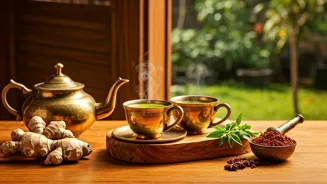In the realm of herbal remedies, ginger and tulsi teas are popular choices. But which one reigns supreme when it comes to boosting digestion, immunity,
and overall well-being? Let's dive into this flavorful comparison!
The Ginger Root Wonders
Ginger tea, a staple in Indian households, is renowned for its digestive properties. It helps soothe nausea, reduces inflammation, and boosts immunity. Known for its strong flavour and warming effect, ginger tea is often mixed with other spices like cardamom or cloves for enhanced flavour and benefits. It's a kitchen superhero!
Tulsi: The Holy Basil
Tulsi, or Holy Basil, holds a sacred place in Indian culture and Ayurveda. Tulsi tea is celebrated for its adaptogenic qualities, helping the body manage stress and boosting the immune system. It also supports respiratory health, making it a favourite during seasonal changes. The aroma and flavour of tulsi are often enjoyed with honey.
Digestion: A Balancing Act
Both teas aid digestion, but they do so differently. Ginger tea stimulates digestive enzymes, which helps with food breakdown, while tulsi reduces bloating. For the Indian diet, often rich in spices and heavy ingredients, both teas offer valuable support, making digestion smoother and more comfortable after a meal.
Immunity: A Protective Shield
When it comes to immunity, both teas are excellent choices. Ginger has potent anti-inflammatory properties that bolster the immune system. Tulsi, with its rich antioxidant content, helps to fight off infections and protect the body from oxidative stress, making both perfect for warding off seasonal ailments, especially during monsoon season.
Making The Right Choice?
Both ginger and tulsi teas offer unique health benefits. Consider your specific needs and preferences. If you're struggling with digestion, ginger might be your go-to. If stress is a concern, tulsi could be the better option. You can even blend them for a powerful combination to suit your palate and wellbeing. Cheers to your good health!













